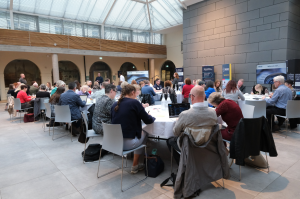Why is Lived Experience involvement and engagement so important?
September 16, 2024Blog
Post Title
MQ Mental Health research is an award-winning charity which funds much-needed scientific research to transform the lives of everyone affected by mental illness, working to create a world where mental illness is understood, effectively treated and ultimately prevented. MQ Mental Health Research are partnering with the Health Innovation Network South London to provide learning and advice around the role of lived experience for the Mindset-XR Innovation Support programme. Through fostering collaboration between the immersive technology sector and mental health providers, Mindset-XR aims to accelerate treatment by leveraging immersive digital therapies to offer faster and more accessible support for individuals with mental health concerns.
Championing the voices of people with lived and living experience of mental illnesses in research is at the core of MQ Mental Health’s work, and they have set up a Lived Experience Expert Network made up of over 100 people from 25 countries around the world who collaborate on our research programmes and projects. In this blog, Mariana Bolivar, Research Programme Lead at MQ Mental Health, discusses why lived experience involvement is crucial for innovators to consider.
People with lived experience of mental illness, either because they themselves have experienced it or they are caring for someone who does, have a wealth of valuable knowledge to share. We know that lived experience involvement and engagement are crucial for successful and impactful research and product development in mental health tech research.
Within the context of healthcare, we define lived experience as personal knowledge gained directly and first-hand, rather than through representations constructed by other people.
Clinicians, researchers and innovators may not have first-hand experience of living with the mental health condition they are trying to find solutions for, which makes active participation from people who can provide personal insights on how the condition made them feel and what it’s like to live with on a daily basis all the more important.
Many research projects fall into the so-called ‘valley of death’ in research where, following what can be as long as a 17-year period of going through the process from discovery to basic research to applied research, product development and ultimately production, they fail to have real-life application.
Actively engaging Lived Experience Partners from the outset, seeking their feedback and using their insights to help inform the design and delivery of a research project, leads to more active co-production where responsibility and power are shared at all stages, leading ultimately to healthcare solutions that better suit their needs.
However, we know there are barriers to be aware of when engaging with Lived Experience Partners, which include digital inequalities, communication challenges and accusations of tokenism.
These can all be avoided by taking the time to understand the needs of lived experience partners, making sure there are alternatives to digital strategies where necessary, limiting the use of jargon and hard-to-understand terminology and ensuring that Lived Experience Partners are included in every stage of the decision-making process, so their contribution is valued and actual.
It is also important to make sure you involve a range of voices where possible, with a diversity of experience and backgrounds.
There are UK Standards for Public Involvement which are a useful starting point, providing guidance around inclusivity, working together in a respectful way that values all contributions and offering support and learning opportunities.
The Association of Medical Research Charities (AMRC) is another helpful resource offering information on how to fairly compensate those with lived experience who take part in your projects.
We know from our own experience that working in partnership with those with lived experience and making projects more user-led brings better results, ensuring tech products lead to tangible improvements in people’s lives.
MQ Mental Health Research are one of our partners on the Mindset-XR Innovation Support programme.
Please visit our dedicated pages to find out more about the programme and sign up to our monthly newsletter.



